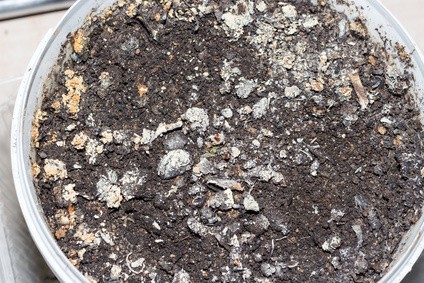Mold infestation can occur on any compost pile. Molds are found everywhere in nature and naturally multiply on the waste that is intended for composting. If you walk through nature with your eyes open, you can also spot mold in many places there. You should only do something if there is a heavy infestation of mold in the compost.
Contents
Mold is quite natural
Some gardening enthusiasts who have little experience are alarmed when they discover that white mold is spreading in the composter. It usually shows up as a white web that coats damp materials.
The first thing to do is sound the all-clear. White mold in a composter is not like mold on food intended for consumption.
This type of mold is highly harmful to health. Infested food should not be consumed under any circumstances, but destroyed.
Mold in the composter, on the other hand, is harmless, at least in small quantities. The spores of the molds are present everywhere in the environment and also settle in or on the compost. If you find ideal conditions, the molds can multiply rapidly.
For white mold to thrive, heat and especially moisture are important factors. In small quantities, it is harmless and can be tolerated without concern. You should only take action if it appears in larger quantities and, for example, also affects the finished compost.
Why does compost mold?
If heavy mold growth occurs in the composter, it is a sign that something is wrong. Possible causes include:
Too much moist material in the composter is one of the most common mistakes. It promotes mold because it needs moisture to grow.
Bread in the compost. Just like other baked goods and food scraps, bread not only promotes mold growth, but attracts bugs. Food scraps belong in the organic waste garbage can.
Composters poorly ventilated. This danger is particularly prevalent in closed composters such as rapid composters and thermal composters. Lack of oxygen slows down composting and promotes the spread of mold.
What to do in case of mold in the composter?
You don’t need to do anything if it is weak. The mold will disappear by itself and become finished compost.
In case of strong infestation, you need to find out the cause of the infestation and eliminate it, otherwise the mold will appear again and again.
Turn compost pile
Composting is done by small and micro organisms that are found in the soil. Under optimal conditions, they produce mature compost in a relatively short time.
In so-called hot rotting, composting proceeds quickly. Temperatures of +60 – 70°C kill molds. You promote hot rotting by turning the compost.
Turning does not mean digging up. You practically turn the compost pile upside down. The top layers go to the bottom, the bottom layers to the top. The material is loosened, mixed and enriched with oxygen.
Reduce moisture
Too much moisture in the compost is often behind the moldiness of the compost. You can reduce it by mixing dry materials together with coarse material under the moist waste.
For example, dry leaves, shrub trimmings, sawdust, or torn egg cartons work well. Collect such things and simply mix in with the waste.
Another option is to cover the compost pile during heavy rain or snowfall. By doing this, you will reduce moisture intrusion and waterlogging.
Frequently asked questions
Is white mold dangerous in the garden?
No, mold on plant parts in the soil is a completely normal occurrence that can happen anywhere in small amounts. For example, it is normal for foliage to mold on the ground. This mold has nothing to do with dangerous plant diseases such as powdery mildew.
What to do in case of mold?
Occurrence of mold indicates that something is wrong, at least if the infestation is on a larger scale. Minor infestations play little role in successful composting. Control mold by turning the compost and adding dry materials to the waste.
Why is composting waste so beneficial?
By composting, you recycle waste and use it wisely for fertilizing plants. Compost soil is an important part of gardening. It improves fertility and soil quality naturally.


